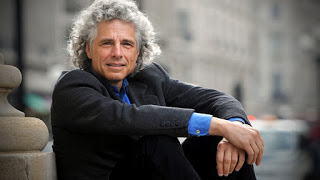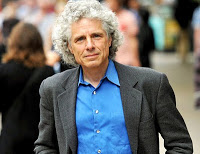Philosophy
 "Our conceptions of human nature affect every aspect of our lives, from the way we raise our children to the political movements we embrace. Yet, just as science is bringing us into a golden age of understanding human nature, many people are hostile to the idea. They fear that a biological understanding of the mind will be used to justify inequality, subvert social change, dissolve personal responsibility and strip life of meaning and purpose.
"Our conceptions of human nature affect every aspect of our lives, from the way we raise our children to the political movements we embrace. Yet, just as science is bringing us into a golden age of understanding human nature, many people are hostile to the idea. They fear that a biological understanding of the mind will be used to justify inequality, subvert social change, dissolve personal responsibility and strip life of meaning and purpose.
In The Blank Slate, Steven Pinker (bestselling author of The Language Instinct, How the Mind Works, The Stuff of Thought, and The Better Angels of Our Nature) explores the idea of human nature and its moral, emotional, and political colorings.
 He shows how many intellectuals have denied the existence of human nature by embracing three linked dogmatic myths: The Blank Slate (the mind has no innate traits), The Noble Savage (people are born good and corrupted by society), and The Ghost in the Machine (each of us has an immaterial soul that makes choices free from biology). Each dogma carries a moral burden, so their defenders have engaged in desperate tactics to discredit the scientists who are now challenging them.
He shows how many intellectuals have denied the existence of human nature by embracing three linked dogmatic myths: The Blank Slate (the mind has no innate traits), The Noble Savage (people are born good and corrupted by society), and The Ghost in the Machine (each of us has an immaterial soul that makes choices free from biology). Each dogma carries a moral burden, so their defenders have engaged in desperate tactics to discredit the scientists who are now challenging them.
Pinker tries to inject calm and rationality into these debates by showing that equality, progress, responsibility, and purpose have nothing to fear from scientific discoveries about human nature. He disarms even the most menacing threats with clear thinking, common sense, and pertinent facts from science and history.
Despite its popularity among intellectuals during much of the twentieth century, he argues, the doctrine of the Blank Slate may have done more harm than good. It denies our common humanity and our individual preferences, replaces hard-headed analyses of social problems with feel-good slogans, and distorts our understanding of government, violence, parenting, and the arts."
Don't you feel just a little bit smarter now? :)
- Is There Progress In Art? Society?
I'm working through Max Weber's methodological essays and one of the points he argues is that social progress is a myth. Across the ideological spectrum of founding fathers of sociology, from Marx's communist view to Spenser's free...
- Debunking The "naturalistic" Argument Against Gay Marriage, Part Ii
Yesterday we began considering the argument that one hears from gay marriage opponents that the state should not grant equal rights to gay and lesbian couples because being gay is immoral due to its unnaturalness. The argument has two steps: 1) Homosexuality...
- The Philosopher In The World - A Talk By Tim Addey
[I am currently attending in London a very interesting series of 5 talks/seminars presented by the Prometheus Trust. A sample of the notes to the first talk is below with a link to the full notes on the Trust?s website for those that like the flavour...
- Ed Yong - Suicidal Wasps, Zombie Roaches & Other Parasite Tales
By its very nature, philosophy is an iconoclastic discipline, dedicated to questioning and dissecting the basic assumptions we use to make sense of our experience, in order to get a better understanding of reality and of the human condition. It was the...
- Darwin's Dangerous Idea - Body & Soul
It took Darwin about twenty years to publish the theory that made him feel like he was confessing to a murder (God's perhaps?), but how did he come to articulate the theory in his own mind? His voyage in the HMS Beagle had a lot to do with it, certainly,...
Philosophy
The Blank Slate: The Modern Denial of Human Nature

In The Blank Slate, Steven Pinker (bestselling author of The Language Instinct, How the Mind Works, The Stuff of Thought, and The Better Angels of Our Nature) explores the idea of human nature and its moral, emotional, and political colorings.

Pinker tries to inject calm and rationality into these debates by showing that equality, progress, responsibility, and purpose have nothing to fear from scientific discoveries about human nature. He disarms even the most menacing threats with clear thinking, common sense, and pertinent facts from science and history.
Despite its popularity among intellectuals during much of the twentieth century, he argues, the doctrine of the Blank Slate may have done more harm than good. It denies our common humanity and our individual preferences, replaces hard-headed analyses of social problems with feel-good slogans, and distorts our understanding of government, violence, parenting, and the arts."
Don't you feel just a little bit smarter now? :)
- Is There Progress In Art? Society?
I'm working through Max Weber's methodological essays and one of the points he argues is that social progress is a myth. Across the ideological spectrum of founding fathers of sociology, from Marx's communist view to Spenser's free...
- Debunking The "naturalistic" Argument Against Gay Marriage, Part Ii
Yesterday we began considering the argument that one hears from gay marriage opponents that the state should not grant equal rights to gay and lesbian couples because being gay is immoral due to its unnaturalness. The argument has two steps: 1) Homosexuality...
- The Philosopher In The World - A Talk By Tim Addey
[I am currently attending in London a very interesting series of 5 talks/seminars presented by the Prometheus Trust. A sample of the notes to the first talk is below with a link to the full notes on the Trust?s website for those that like the flavour...
- Ed Yong - Suicidal Wasps, Zombie Roaches & Other Parasite Tales
By its very nature, philosophy is an iconoclastic discipline, dedicated to questioning and dissecting the basic assumptions we use to make sense of our experience, in order to get a better understanding of reality and of the human condition. It was the...
- Darwin's Dangerous Idea - Body & Soul
It took Darwin about twenty years to publish the theory that made him feel like he was confessing to a murder (God's perhaps?), but how did he come to articulate the theory in his own mind? His voyage in the HMS Beagle had a lot to do with it, certainly,...
